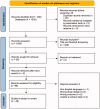Management of psychotropic medications in adults with intellectual disability: a scoping review
- PMID: 36120887
- PMCID: PMC9518601
- DOI: 10.1080/07853890.2022.2121853
Management of psychotropic medications in adults with intellectual disability: a scoping review
Abstract
Background/objective(s): Psychotropic medications are commonly prescribed among adults with intellectual disability, often in the absence of a psychiatric diagnosis. The aim of this scoping review is to provide an overview of the extent, range, and nature of the available research on medication use and practices and medication management in people with intellectual disability taking psychotropic medications for behaviours that challenge.
Materials and methods: A scoping review of research studies (qualitative, quantitative, and mixed design) and Grey Literature (English) was carried out. Databases included: Ovid MEDLINE, Embase, CINAHL, JBI Evidence Synthesis, Cochrane Central Register of Controlled Trials, Cochrane Database of Systematic Reviews, PsycINFO, and Scopus. A three-step search strategy was followed, with results screened by two independent reviewers. Data was extracted independently by two reviewers using a data extraction tool with results mapped and presented using a narrative form supported by tables and diagrams to the research questions.
Results: Following the removal of duplicates, records were screened, full texts assessed, and 49 studies were included. Medication outcomes included reduced repetitive, stereotypic, and/or aggressive behaviours. High dosing/prescribing in the setting of an absent/unclear clinical indication was associated with worsening of symptoms for which psychotropics were prescribed. While psychotropics had a role in managing behaviours that challenge, reducing or discontinuing psychotropics is sometimes warranted. Study designs were frequently pragmatic resulting in small sample sizes and heterogeneous cohorts receiving different doses and combinations of medications. Access to multidisciplinary teams, guidelines, medication reviews, staff training, and enhanced roles for carers in decision-making were warranted to optimize psychotropic use.
Conclusions: These findings can inform prescribing interventions and highlight the need for timely and comprehensive patient outcome data, especially on long-term use of high doses of psychotropics and what happens when reduce or stop prescribing these doses.KEY MESSAGESPsychotropic medications are frequently prescribed for people with intellectual disabilities, often at high doses and these medications are associated with both positive and negative patient outcomes.Work to rationalize psychotropic use has been reported with interventions aiming to reduce polypharmacy or deprescribe a single psychotropic medicine. These interventions had mixed success and risk of relapse was documented in some studies.Limitations in sample size and heterogenous patient cohorts make it challenging to understand the risks and benefits associated with reducing or stopping psychotropic medicines.Patient, carer, and clinician partnerships are critical to advance medication management.
Keywords: Behaviours that challenge; intellectual disability; medication management; mental health; polypharmacy; psychotropics; scoping review.
Conflict of interest statement
No potential conflict of interest was reported by the author(s).
Figures
References
-
- Schalock RL, Luckasson R, Tasse MJ.. Intellectual disability: definition, classification, and systems of supports. 12th ed. Silver Spring, Maryland: American Association on Intellectual and Developmental Disabilities; 2021. - PubMed
-
- Deb S, Unwin G, Deb T.. Characteristics and the trajectory of psychotropic medication use in general and antipsychotics in particular among adults with an intellectual disability who exhibit aggressive behaviour. J Intellect Disabil Res. 2015;59(1):11–25. - PubMed
-
- Marshall T. Audit of the use of psychotropic medication for challenging behaviour in a community learning disability service. Psychiatr Bull. 2004;28(12):447–450.
-
- Health Service Executive Disability Services Community Operations: Medicines Management Steering Group . National framework for medicines management in disability services. Dublin: HSE; 2018. [cited 2022 May 8]. Available from: http://hdl.handle.net/10147/629055
-
- Public Health England . Prescribing of psychotropic drugs to people with learning disabilities and/or autism by general practitioners in England. London: Public Health England; 2015.
Publication types
MeSH terms
Substances
LinkOut - more resources
Full Text Sources
Other Literature Sources

